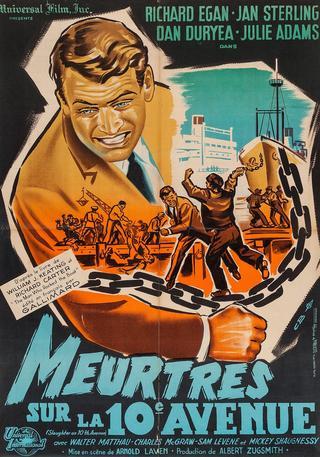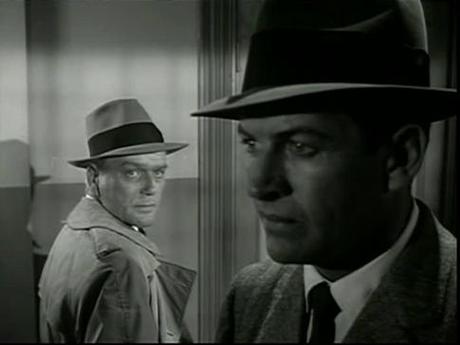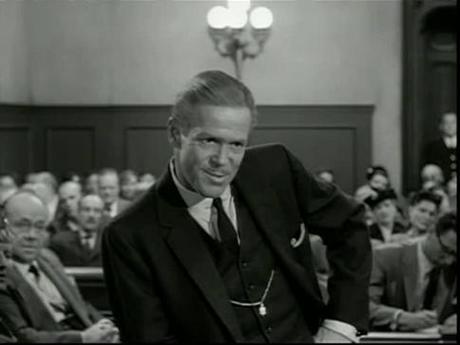
Graft and gangsters on the waterfront probably evoke thoughts of Brando, Kazan et al, but there was more than one movie to make use of that particular milieu. Slaughter on Tenth Avenue (1957), while naturally incorporating some social commentary, follows the template of a more traditional crime story. To add some further confusion the title is borrowed from Richard Rodgers' ballet. The film features the composer's music throughout but it has no direct connection to the on screen events; one could perhaps make a case for both having something to say about the pernicious and tragic effects of crime and poverty on the lives of the underprivileged, but I"m not convinced it's worth heading too far down that route. No, this is essentially a solid crime/noir exposé that sits comfortably alongside, and actually a few notches above, a number of other 1950s productions which looked at how deeply the gangs and racketeers had embedded themselves in post-war society.
The opening is businesslike, shot impersonally from above, as a car purposefully makes its way through the streets of New York, on its way to a killing. While we don't get the stentorian narration that frequently accompanied these socially aware noir pictures, there is a matter of fact feel to the way a grubby little hit is treated as just another part of the daily routine, another minor affair to tick off the agenda before the day begins in earnest. As Solly Pitts (Mickey Shaughnessy) lies, bleeding his guts out on a tenement staircase, and his distraught wife Madge (Jan Sterling) tries to comfort him, the gunmen responsible melt away as unobtrusively as an early morning mist.
Enter Bill Keating (Richard Egan), an inexperienced assistant D.A. and a two-fisted product of the coal mining country of Pennsylvania. He's full of vim and vigor, and the kind of righteous faith in justice that the audience must know will be sorely tested before the credits finally roll. His principal police contact is Lieutenant Vosnick (Charles McGraw), an insider in a neighborhood and beat where Keating is most assuredly an outsider, and something of a tarnished knight whose gritty manner acts as a thin veil for the principles to which he remains true. These two form an idealistic bond, the goal of which is to break the power of the mobsters and their corrosive hold over the blue collar dockworkers, and the means will be the prosecution of those who came to visit Solly Pitts in the early morning.

Slaughter on Tenth Avenue was adapted from Keating's own autobiography The Man Who Rocked the Boat, and directed by Arnold Laven. It rates as one of this filmmaker's best efforts - part noir, part social justice picture, part melodrama, and completely human. Crime stories can sometimes distance themselves from the viewer, the plot twists seeming to relate to intangible "others" rather than to people like ourselves. However, the sense of empathy is never lost in Slaughter on Tenth Avenue, and the characters feel real at all times, the major and minor tragedies touching on their lives perfectly believable.
I mentioned the brisk, no nonsense beginning already, and the courtroom scenes in the second half are also of note, never overcooked as can sometimes be the case. Then there is the ending, which has the courage and imagination to avoid any anti-climactic reaction from the principals. Instead, this is extraordinarily well realized, with the camera soaring in tandem with Rodgers' music, panning out to reveal a now deserted dock as a bruised and disheveled Nick Dennis, the radio announcer's news of the verdict still ringing in his ears, stumbles off towards a hopefully better future. In one hand he's clutching a bottle of hooch, in the other the lawyer's crammed briefcase; truth and justice side by side, as always.

One of the first things to grab the attention about Slaughter on Tenth Avenue is the cast - it's deep and rich, a movie lover's dream. Egan is top-billed, and he was very much a star property at this stage. He had the right kind of quiet brawn to suit the part of the white collar guy who still hasn't put too much distance between himself and his working class roots. Julie Adams, who only recently passed away, makes the most of her limited role as his wife who sticks faithfully by him despite the growing pressures from friends and enemies alike. She has a couple of subtle yet telling scenes with sparse dialogue, not the least of which is the aftermath of the dockside brawl when she tenderly caresses Egan's livid bruises. She doesn't say a word but those simple gestures and looks convey all the character, and we the viewers, needs to know. It's little things such as this that I find very cinematic, very discreet, and very effective. Charles McGraw is typically gruff, although atypically white-haired, and offers a reassuringly pugnacious presence.
Jan Sterling was highly skilled at playing the kind of slightly shop worn dames that were the staple of many a film noir, and she brings that world weary quality to the part of the tough waterfront wife. One becomes accustomed to seeing Dan Duryea in either villainous or slippery roles. He only shows up after the hour mark and, while he is on the side of the villains here as the lead defense lawyer, he gets to play an essentially straight up figure who may wheedle but balks at outright cheating. The real bad egg is Walter Matthau, ruthless and malicious in his determination to maintain control over the longshoremen. It's a masterclass in the art of mean and a fine portrayal of the ugly side of corruption.
Sadly, Slaughter on Tenth Avenue is yet another of those Universal-International films that nobody seems willing or able to release on disc. At the moment, one has to rely on catching the movie if it happens to show up on TV. I feel there is enough depth and quality in the story, direction and cast to warrant wider availability. Lesser works than this have been shown to have an audience so let's hope somebody somewhere gets around to this neglected movie before too long.
